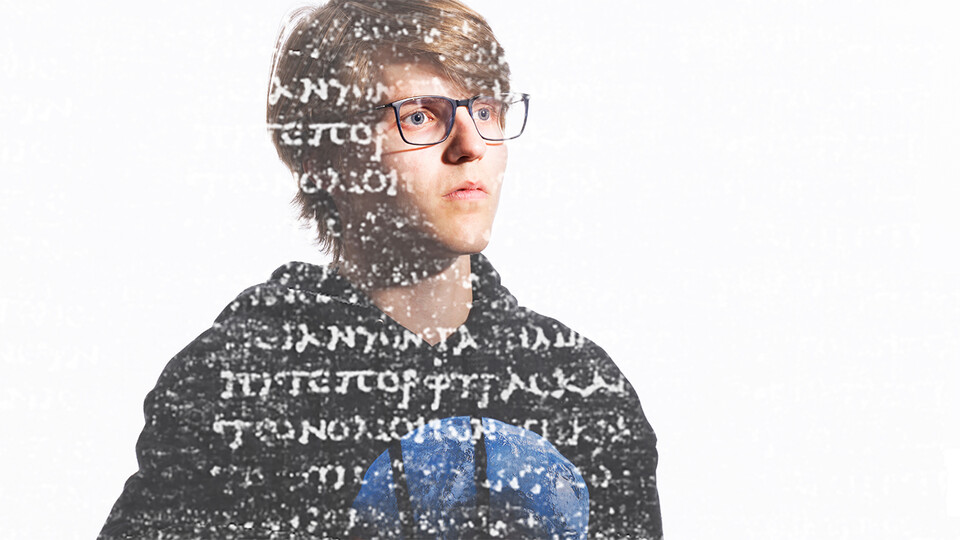Feb 05, 2024
By Scott Schrage | University Communication and Marketing

In late 2023, Nebraska’s Luke Farritor became the first to free a Greek word from its prison: papyrus charred into a lump of carbon by the eruption of Mount Vesuvius nearly 2,000 years ago.
That feat would earn Farritor worldwide acclaim and $40,000 from the organizers of the Vesuvius Challenge, a global effort to decode the writings of burnt scrolls recovered from a library in the Roman town of Herculaneum. For most, it would rank as the achievement of a lifetime.
But the Husker undergrad and Lincoln native was far from finished. On Feb. 5, the Vesuvius Challenge named Farritor, Youssef Nader and Julian Schilliger the co-winners of its $700,000 Grand Prize for deciphering at least four passages of text, each 140-plus characters long, from digital scans of a seared scroll.
Though the text revealed by the team is still being transcribed and translated, an early read suggests that it is a philosophical treatise on pleasure, akin to what the organizers called “a 2,000-year-old blog post about how to enjoy life.” The preliminary analysis has also confirmed that the text was never duplicated, meaning that it has gone unread since at least A.D. 79, when Mount Vesuvius drowned the surrounding area in ash and volcanic mud.
“Sometimes we take breakthroughs such as this for granted, but we should not,” said Farritor, a senior in the University of Nebraska–Lincoln’s Jeffrey S. Raikes School of Computer Science and Management. “It took the combined efforts of many people over several centuries to discover, preserve, scan and now, finally, read and translate these scrolls. It is the privilege of a lifetime to be a small part of this.”
Farritor spent much of the past year developing and training a machine-learning model that could detect ultra-faint differences in the texture of the carbonized scrolls, which are now too delicate to unroll. Those textural differences hinted at the presence of ink — and Greek letters that many thought would never be read again. Eventually, Farritor’s model managed to identify 10 letters in close proximity, enough to earn him the Vesuvius Challenge’s First Letters Prize. Experts would soon conclude that several of those letters spelled the Greek word for “purple.”
With just a few months to go before the Dec. 31 deadline for the Grand Prize, though, Farritor had little time to savor his triumph. Knowing the magnitude of the task before him, Farritor teamed up with Nader and Schilliger, balancing the demands of fall classes and coding sessions. The superteam went to work refining not just the detection of ink — so that they neither missed actual letters nor conjured ones that weren’t there — but also the segmentation of rolled-up papyrus into coherent fragments.
When the Vesuvius Challenge organizers first released their criteria for the Grand Prize, they figured the odds of anyone deciphering even four passages of text were less than 30%. Farritor and the team would sail past the mark, submitting 15 passages that comprised more than 2,000 characters — an estimated 5% of the scroll’s text.
As for its author? The scroll’s content and references point to Philodemus, who was likely the philosopher-in-residence of the library that housed the scroll and many others like it. Philodemus was a proponent of Epicureanism, a philosophical system that values pleasure, especially in the form of a life free from fear and pain.
Richard Janko, one of the papyrologists examining the team’s submission, said the text “quite probably” discusses the pleasure derived from music, and how it compares with the joys of food, drink and beautiful sights. The text even seems to take a shot at the rival school of Stoicism, noting that its advocates “have nothing to say about pleasure, either in general or in particular, when it is a question of definition.”
“Peering at and beginning to transcribe the first reasonably legible scans of this brand-new ancient book was an extraordinarily emotional experience,” Janko said.
A self-described history nerd himself, Farritor said he hopes that the Vesuvius Challenge, and his contributions to it, could eventually help double the amount of readable text from the Greco-Roman era. Situated in a villa thought to be owned by the father-in-law of Julius Caesar, the Herculaneum library containing the burnt scrolls is considered the last of its kind. Roughly 800 of the scrolls extracted from the library now reside in Naples, waiting to be read. And another two stories of the villa have yet to be excavated, potentially hiding thousands of more scrolls.
“We are celebrating right now, but there’s no reason to slow down,” said Farritor, who plans to continue improving the models that helped translate carbon to Greek. “Let’s read the entire library!”